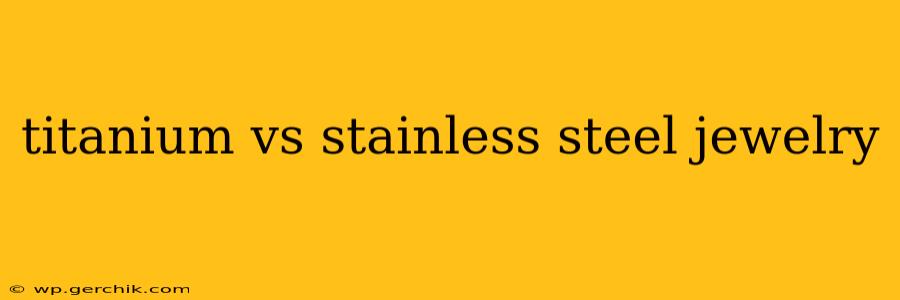Choosing the right metal for your jewelry is a crucial decision impacting both its aesthetics and longevity. Two popular choices often top the list: titanium and stainless steel. Both offer durability and affordability compared to precious metals like gold and platinum, but they possess distinct characteristics that cater to different preferences and needs. This comprehensive guide will delve into the key differences between titanium and stainless steel jewelry, helping you make an informed choice.
What is Titanium Jewelry?
Titanium is a strong, lightweight transition metal known for its exceptional strength-to-weight ratio. It's significantly lighter than stainless steel, making it a comfortable choice for everyday wear, especially for larger pieces. Its hypoallergenic nature is a significant advantage, making it suitable for individuals with sensitive skin prone to reactions from nickel or other common metals. Titanium jewelry boasts remarkable durability, resisting scratches and corrosion exceptionally well. However, its inherent strength can also make it more challenging to work with, resulting in a potentially higher price point for intricate designs.
What is Stainless Steel Jewelry?
Stainless steel, an alloy of iron, chromium, and other elements, is a highly versatile and durable metal. Its resistance to corrosion and tarnishing makes it a popular choice for jewelry that will withstand daily wear and tear. Stainless steel is relatively inexpensive, making it an accessible option for a wide range of budgets and styles. While generally hypoallergenic, some individuals may experience reactions due to the nickel content in certain grades of stainless steel. The wide range of finishes available, from brushed to polished, allows for diverse aesthetic options.
Titanium vs. Stainless Steel: A Detailed Comparison
Here's a head-to-head comparison across key factors:
Durability and Strength:
- Titanium: Exceptionally strong and durable, resisting scratches and dents effectively. Its lightweight nature makes it comfortable for prolonged wear.
- Stainless Steel: Also durable and resistant to corrosion, though potentially heavier than titanium. Susceptible to scratching, though less so than softer metals.
Weight and Comfort:
- Titanium: Significantly lighter than stainless steel, leading to greater comfort, especially in larger pieces.
- Stainless Steel: Heavier than titanium, which may be noticeable in larger or more elaborate designs.
Allergic Reactions:
- Titanium: Highly hypoallergenic, making it ideal for individuals with sensitive skin. Pure titanium is virtually inert.
- Stainless Steel: Generally hypoallergenic, but some grades contain nickel, which can trigger allergic reactions in certain people. Look for "surgical grade" stainless steel for reduced nickel content.
Cost:
- Titanium: Typically more expensive than stainless steel due to the higher cost of the raw material and the more challenging fabrication process.
- Stainless Steel: More affordable than titanium, making it a budget-friendly option.
Maintenance:
- Titanium: Requires minimal maintenance; simply wipe clean with a soft cloth.
- Stainless Steel: Also requires minimal maintenance; a soft cloth is usually sufficient for cleaning.
Appearance:
- Titanium: Often has a darker, more subdued metallic sheen, sometimes with a slightly grayish hue. Can be finished in various ways to achieve different aesthetics.
- Stainless Steel: Available in a variety of finishes, from highly polished to brushed or matte textures, allowing for greater design flexibility.
Is titanium jewelry better than stainless steel?
There isn't a universally "better" metal; the ideal choice depends on individual needs and priorities. Titanium excels in strength, lightness, and hypoallergenic properties, justifying its higher price for those prioritizing comfort and allergy prevention. Stainless steel offers a more budget-friendly option with good durability and aesthetic versatility.
What type of stainless steel is used for jewelry?
Jewelry-grade stainless steel often uses 316L stainless steel, a surgical-grade option known for its high corrosion resistance and biocompatibility, meaning it's less likely to cause allergic reactions. However, it's still important to note that some individuals may be sensitive even to 316L stainless steel.
Can titanium jewelry tarnish?
Titanium is remarkably resistant to tarnish and corrosion. Its inert nature means it won't oxidize or react with the environment, resulting in long-lasting shine and color.
Does titanium jewelry scratch easily?
While exceptionally strong, titanium can still be scratched, though it's significantly more scratch-resistant than many other metals. Proper care and storage can minimize the risk of scratches.
Ultimately, the best choice between titanium and stainless steel jewelry comes down to your personal preferences, budget, and sensitivity to metals. Weighing the pros and cons of each material will guide you toward the perfect metal for your next jewelry purchase.
